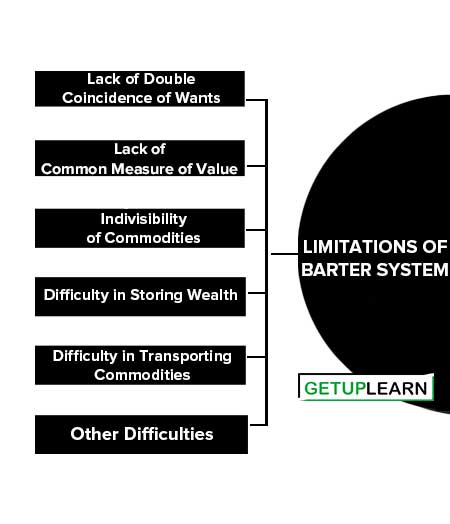Table of Contents
What is Barter System?
The direct exchange of one commodity for another without the mediation of money is called barter. This system of exchanging goods for goods continued to prevail before the invention of money.
Because of certain uses of the barter system, it still prevails in certain backward parts of India and other underdeveloped countries. Particularly in villages, the direct exchange of goods for goods still prevails in India. Wage payments in kind to agricultural laborers are nothing but one manifestation of the barter system.
The system of barter is simple. It increases cooperation and is usually free from the evils of money. This system is particularly suitable for primitive and self-sufficient pre-industrialized economies where the exchange requirements of people are limited.
However, with increasing economic development, as the market economy and the exchange requirements expand, the barter economy fails to deliver the goods. An increasing division of labor, which is a necessary concomitant of development, gives rise to increasing exchange, which encourages ever-improving monetary instruments.
It is next to impossible that all wishes of individuals, who enter into a barter system, should coincide as to the kind, quality, quantity, and value of the things, which are mutually desired. This is especially true for a modern economy in which on a single day millions of persons may exchange millions of commodities and services.
Limitations of Barter System
A medium of exchange that everyone is willing to accept easily overcomes the difficulties of barter because by splitting the actions of barter into purchases and sales which are independent of each other, the need for people’s wishes to coincide exactly as quality, and value, time, and place is eliminated.
We can enumerate the following main limitations of barter system:
- Lack of Double Coincidence of Wants
- Lack of Common Measure of Value
- Indivisibility of Commodities
- Difficulty in Storing Wealth
- Difficulty in Transporting Commodities
- Other Difficulties

Lack of Double Coincidence of Wants
Under the barter system, it is necessary that the wants of two persons who wish to exchange goods must coincide. Suppose X has wheat and he wants sugar. Then X must find a person who has sugar and who is ready to exchange sugar for wheat.
Barter, thus, required a double coincidence of wants which, in practice, is difficult to be found. However, goods can be exchanged for money, which is usually the most acceptable medium of exchange.
Lack of Common Measure of Value
The barter system suffers from the fact that there is no common measure of value. In the above example, even if X succeeds in finding out a person who is having sugar and is willing to exchange his sugar for wheat, the problem will not end here: for how much of wheat how much sugar should be exchanged?
The exchange of goods cannot take place unless and until the two persons agree to exchange some given quantity of goods with each other. Since there is no common measure in terms of which the values of different goods can be expressed, the ratio of exchange of two goods will be arbitrary and vary from person to person depending upon their intensities of want for different goods.
Indivisibility of Commodities
The barter system fails in respect of many articles, which are indivisible. Suppose a man is having a horse and he wishes to exchange his horse for wheat, rice, vegetables, and so on. He cannot break his horse into pieces and then go to the individual sellers of the above commodities to exchange pieces of a horse with other commodities.
Thus, certain commodities which are indivisible cannot be bartered away. However, this difficulty has been removed by the invention of money. Horses can be sold for money, which can then be used for the purchase of different commodities. The rest of the money can be stored for other purposes. This brings us to another difficulty of barter, i.e., storing wealth.
Difficulty in Storing Wealth
In the above example, suppose the seller of a horse does not want to spend all his sale proceeds from the horse instantaneously. Suppose he wants to store some of his sale proceeds for future needs.
Under the barter system he can do this only by storing some commodities, say wheat. But, wheat cannot last longer than one year. And that too would require great skill. Obviously, life would be highly insecure without the use of money.
Difficulty in Transporting Commodities
Under the barter system, one has to transport goods and services from one place to another. Suppose a shepherd wishes to exchange his sheep for other commodities.
Then he will have to travel a long distance along with his herd to find the sellers of commodities he wishes to buy and who are willing to purchase his sheep. In this process, it is possible that the shepherd may lose a number of sheep on the way or he may be looted. The invention of money has saved us from the drudgery of transporting goods.
Other Difficulties
Besides the above-mentioned difficulties, one can add many more.
- How to exchange different services under the barter system?
- How can a teacher be paid?
- How can one evaluate the service rendered by a musician or a doctor?
- Further, the process of borrowing and lending would be extremely difficult under the barter system. How to settle deferred payments, i.e., calculate the rate of interest?
- In a nutshell, we can say that the barter system cannot cope with the development of a modern industrial society that is based on the division of labor. The workers are paid much before the final output, i.e., they are paid daily, weekly, or monthly, whereas the final output may come after, say six months or one year. In certain cases, this period may be much longer (e.g. in heavy industry). In the intervening period, the workers and other factors of production will have to be paid. How to do this without the use of money?
Thus, money has not only saved us from the inconvenience of barter but maximum satisfaction out of limited resources has also become possible because of the use of money. In the words of Professor Robertson, “The need for money then seems to be fundamental, if a given volume of productive power is to be made to yield the greatest harvest of individual satisfaction which it is capable of yielding.”
FAQs About the Barter System
What is meaning barter system?
The direct exchange of one commodity for another without the mediation of money is called barter. This system of exchanging goods for goods continued to prevail before the invention of money.
What are the limitations of barter system?
The following are the limitations of barter system:
1. Lack of Double Coincidence of Wants
2. Lack of Common Measure of Value
3. Indivisibility of Commodities
4. Difficulty in Storing Wealth
5. Difficulty in Transporting Commodities
6. Other Difficulties.

